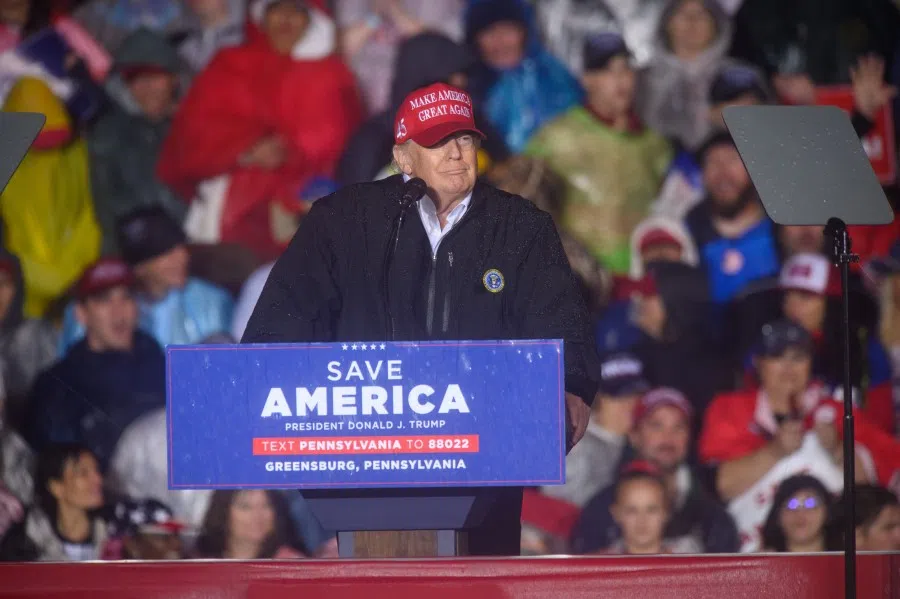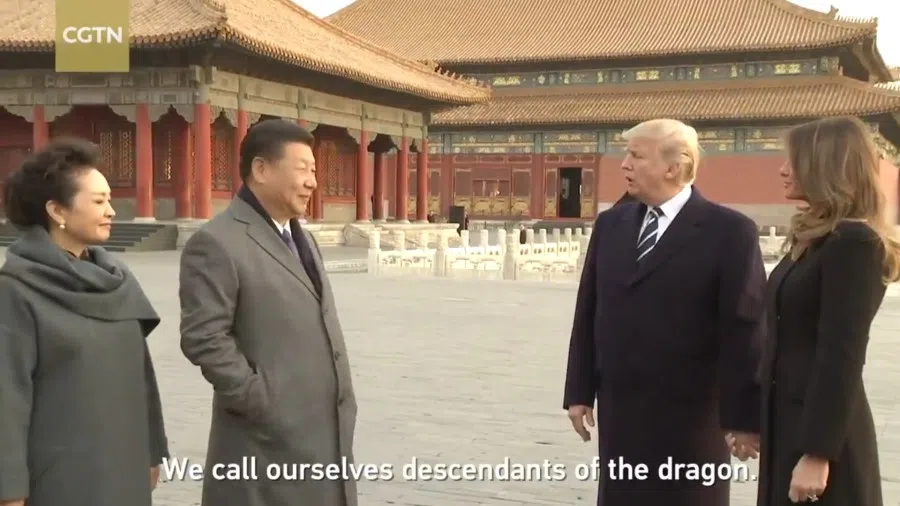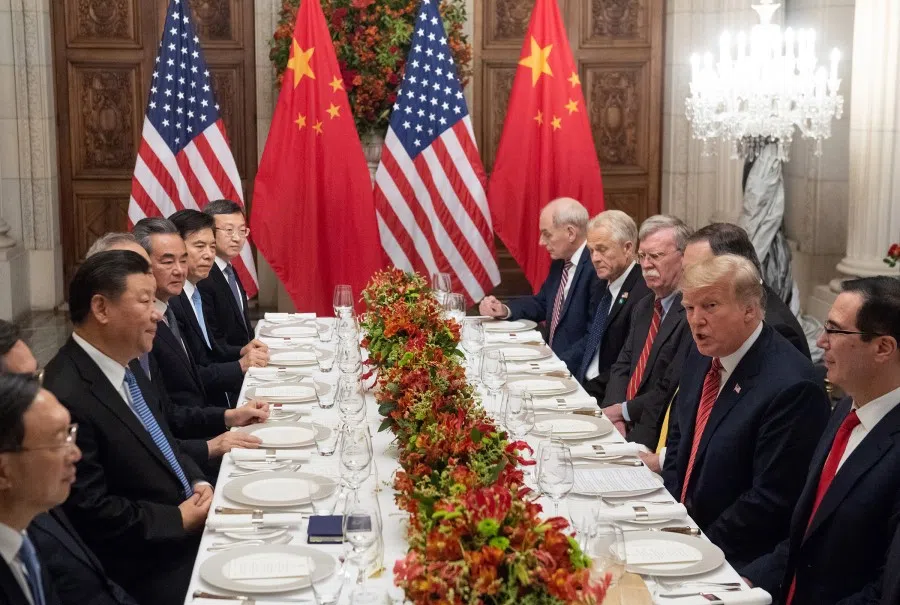Russia-Ukraine war has triggered another split in China-US relations
Economics professor Zhu Ying observes that since US-China relations reached their high point after former President Trump's visit to Beijing in 2017, China-US relations have seen three splits, each driven by the trade war, the pandemic and the war in Ukraine respectively. Amid tense relations and set identities that have been formed, one can only hope that the US and China do not stumble into a hot war.

Who are China and the US's respective friends and enemies? This is the key question in China-US relations. Only when these questions are resolved can we establish whether the China-US relationship is one of cooperation or competition, or even opposition.
Of course, even among friends, there is conflict and friction - as can be seen in the relationship between Europe and the US. Furthermore, being enemies does not necessarily mean being in opposition.
In the past, China and the Soviet Union should have been friends, but they went to war with each other, and the Soviet Union even considered using nuclear weapons on China. On the other hand, China and the US fought each other during the Korean War, but they subsequently joined forces against the Soviet Union's "social imperialism".
Meaning of a split in relations
In developing China-US relations, each side needs to first determine the identity of the other. China's identity should be a no-brainer given its communist DNA. But it is an issue for the US as the country has too much confidence in liberalism, and dreams that after reform and opening up, China would ultimately move in a "peaceful evolution" towards Western-style democracy. This was why ideas like "the end of history" and the convergence of capitalism and socialism were popular for a while. But the US needs to wake up from its dreams and face reality.

Donald Trump changed the US's stance towards China when he became president, and since then, China and the US have been on a path of division. The China-US trade war, the pandemic and the Russia-Ukraine war have been drivers of the China-US split.
But a split does not necessarily mean opposition and conflict. It is simply a matter of reaffirming each other's identities and demarcating the lines between friend and foe, and once the lines are clear, one can begin to develop strategies and tactics against each other. Neither does it mean a complete decoupling or going back to the past where "never the twain shall meet".
But what a split does mean is a deliberate attempt to keep each other at arm's length, where there exists mutual suspicion and partial decoupling, and - if care is not taken - military conflict.
Trump was treated with "imperial" hospitality in the Forbidden City, but upon returning to the US, he took a series of measures that worsened bilateral relations.
A rollercoaster ride
In the history of China-US relations, bilateral relations started thawing with then US President Richard Nixon's visit to China in 1972, and started deteriorating around the time of the Trump administration. The Biden administration is seeing this decline through.
From the Nixon to the Trump eras, China-US relations went from low to high, with Trump's visit to China in 2017 thought to be the pinnacle, after which a decline was soon to follow.
What is the basis for saying that Trump's visit to China was a high point in China-US relations? China received Trump with a "state visit-plus" welcome, an honour never before accorded to any US president or a foreign head of state visiting China.

Trump was treated with "imperial" hospitality in the Forbidden City, but upon returning to the US, he took a series of measures that worsened bilateral relations. Hence, one could say that Trump's visit to China was the peak of China-US relations after which everything fell apart; and this abrupt change could also be inferred from the writings of H.R. McMaster, former national security adviser to the Trump administration.
In 2021, McMaster described Trump's visit to China in his book Battlegrounds: The Fight to Defend the Free World. He said that at the last meeting at the Great Hall of the People, Chinese Premier Li Keqiang made the "observation that China, having already developed its industrial and technological base, no longer needed the United States. He dismissed US concerns over unfair trade and economic practices, indicating that the US role in the future global economy would merely be to provide China with raw materials, agricultural products, and energy to fuel its production of the world's cutting-edge industrial and consumer products. President Trump listened for as long as he could and then interrupted the premier, thanked him, and stood up to end the meeting."
McMaster added that he and former deputy national security adviser Matt Pottinger later discussed how Premier Li's monologue had revealed the CCP's break from Deng Xiaoping's guidance during China's opening and reform period in the 1990s: to hide their capabilities while biding time, to avoid taking the lead and to be focused on accomplishing something.
According to McMaster, it led to a new understanding of the CCP's obsession with control and that China would do everything it could to achieve national rejuvenation, even at the expense of US interests and the liberal international order.
In response, the US made new assumptions about China's behaviour, including the fact that China would not liberalise its economy or its form of government. China would also not play by existing international rules and would even try to replace them. It would try to dominate the global economy and fields of disruptive technologies through "economic aggression" and "industrial espionage". And if the US and its alliances do not put up a good fight, China would promote "its statist economy and authoritarian political model as an alternative to free-market economics and democratic governance".
The Trump administration brought about the first split in China-US relations, and the US government decided from then on about the Chinese government's identity.

It is apparent that the turn for the worse in China-US relations took place after Trump's visit to China and his government began formulating a series of measures that turned a trade war into the new Cold War. The Trump administration brought about the first split in China-US relations, and from then on the US government had made a decision about the Chinese government's identity.
A battle of systems and civilisations?
The second split in China-US relations occurred over the Covid-19 pandemic. In 2020, the Chinese government brought the outbreak under control within a short time, but the Western countries, especially the US, failed to control the outbreak and saw a huge number of deaths. Chinese Vice-Minister of Foreign Affairs Le Yucheng said that China quickly achieved major strategic results in handling the pandemic, which became the "shining moment" for the socialist system with Chinese characteristics.
A Chinese article titled "Time to Wake Up From Blind Faith in the Western System" said that Western countries' failure to contain the Covid-19 pandemic resulted in a serious social crisis. It pointed out that as some Chinese people have always thought that the Western system was superior, they were unable or unwilling to acknowledge the advantages of the socialist system with Chinese characteristics.
... it is essentially a battle of systems, national power, governance and even civilisations.

While China experienced a resurgence in Covid-19 cases in early 2022, officials insisted on upholding the zero-Covid policy. An article published in Shenzhen Special Zone Daily stated that while the dynamic zero-Covid policy and the policy of living with the virus may appear to be a battle of anti-epidemic concepts, strategies and methods, it is essentially a battle of systems, national power, governance and even civilisations. Clearly, China has decided on the respective identities of China and the US.
The US was unhappy with China's pandemic measures and took action that worsened its relationship with China, including partially decoupling from China in the areas of technology, supply chains, personnel exchanges and investments. Since President Joe Biden took office in 2021, China-US relations have largely remained tense. In fact, it is becoming clearer that Biden is using his "alliance of democracies" initiative to contain China.
The US has also witnessed the Chinese government's ability to mobilise its population of 1.4 billion people and to create ripple effects in various countries, namely through Confucius Institutes around the world, the Belt and Road Initiative and the Grand External Propaganda Campaign. The US has become increasingly concerned with these means of encroachment, which ultimately strengthen its beliefs in the respective identities of the two countries and what they each represent.
China a 'strategic competitor' to the US
The Russia-Ukraine war is the third split between China and the US. The US stands in opposition to Russia but China has grown closer to Russia. Following the outbreak of the Russia-Ukraine war, Chinese Foreign Minister Wang Yi asserted that the friendship between China and Russia is "rock solid".
At the same time, Vice-Minister of Foreign Affairs Le also said during a meeting with Russian ambassador to China Andrey Denisov, "No matter how the international landscape may change, China will continue to strengthen strategic coordination with Russia for win-win cooperation."
Amid "profound changes unseen in a century", China believes that "the East is rising while the West is declining"...

If China supported the US in the Russia-Ukraine war and chose to condemn Russia's invasion of Ukraine - just as it did back in 2001 when then Chinese President Jiang Zemin sent his condolences to then US President George W. Bush over the September 11 attacks and condemned "all violent activities by terrorism" - would that have reversed current China-US relations?
Jiang's response demonstrated that China's higher-ups were aware that an opportunity had presented itself, as China-US relations were marred by the Hainan Island incident at the time. Because of the approach he had taken, the Chinese economy boomed after 2001 and China's foreign relations saw an unprecedented upswing.
There are no ifs and buts in history. The current situation is inherently different from that in 2001. Today's China has become powerful and can "view the world on an equal level".
Amid "profound changes unseen in a century", China believes that "the East is rising while the West is declining", holds fast to the "four confidences", and strives to "have character, integrity, and courage so that we'll never be taken in by fallacies, never tremble in the face of danger, and never be spineless cowards". On major issues of principle, the Chinese will "take a sober and firm stance".
Similarly, the US is also taking a tougher stance on China's position. In his book US-China Relations: Perilous Past, Uncertain Present, Robert Sutter, former national intelligence officer for East Asia and the Pacific at the US Government's National Intelligence Council, wrote that from early 2018, the US Congress put forward around 300 pieces of anti-China legislation in their increasingly negative response to the multifaceted challenges posed by China.
The Russia-Ukraine war has only made Washington more certain that China and Russia are working together to challenge the US, which in turn deepens the antagonism that the US government, US Congress and others have towards China.

Earlier in December 2017, Trump had called China a "strategic competitor" in his first National Security Strategy, reflecting the alignment between the administration and the US Congress, and calling this the "Washington consensus".
Sutter also pointed out that China and Russia have a close relationship and that the Russia-Ukraine war will have a profound impact. Upon closer inspection, the US realised that almost all aspects of China-Russia cooperation are aimed at undermining US influence. At the same time, both China and Russia share the view that the US is on the decline and cannot counter their actions.
The Russia-Ukraine war has only made Washington more certain that China and Russia are working together to challenge the US, which in turn deepens the antagonism that the US government, US Congress and others have towards China. It is expected that the US will take on an even tougher stance against China in the future.
This February, on the 50th anniversary of Nixon's historic visit to China, America Second: How America's Elites Are Making China Stronger by Isaac Stone Fish was published in the US. The author mentions Henry Kissinger among other prominent figures as an "agent of Chinese influence", who should take the greatest responsibility for the current state of US-China relations.
American sinologist Perry Link, who was an interpreter for the US table tennis delegation that visited China, noted that the book nailed the situation on the head when it assessed that the US had in fact nurtured a snake (referring to China) in its bosom.
Clearly, the US's hawkish stance against China will have a profound impact on the future of China-US relations. Biden has repeatedly expressed that the US "does not seek a new Cold War with China" or "aim to change China's system". We ordinary people can only hope that China-US relations will never reach the point of a hot war.
Related: Neither will submit: Why the Russia-Ukraine war will be the cruellest since World War II | How Putin became trapped by his own authoritarianism | The Russia-Ukraine war has accentuated the democratic-autocratic divide | The Pelosi visit that wasn't: How should China respond to provocations from US politicians? | Xi Jinping's answer to Washington's expansionist moves in Asia and the world | The curse of political correctness in China and the US



![[Big read] When the Arctic opens, what happens to Singapore?](https://cassette.sphdigital.com.sg/image/thinkchina/da65edebca34645c711c55e83e9877109b3c53847ebb1305573974651df1d13a)

![[Video] George Yeo: America’s deep pain — and why China won’t colonise](https://cassette.sphdigital.com.sg/image/thinkchina/15083e45d96c12390bdea6af2daf19fd9fcd875aa44a0f92796f34e3dad561cc)